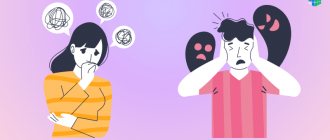You feel like you want to sleep, but as soon as your head touches the pillow... a global thought process begins. For some reason, you remember that shameful incident that happened in the seventh grade, analyze the reasons for the breakup with your past partner, finding out who was really to blame, and come up with the ideal image for tomorrow, because why not.
Simply put, at a time when it would seem you need to relax and let go of all thoughts, your brain begins to work in a way that it never works in the office (although that’s exactly where it should be). Common situation?
Experts in the field of sleep disorders call this state racing mind (literally “mind race”), noting that before an important event, be it an exam, an interview or a wedding, something similar is typical for everyone. However, if you constantly think about life before going to bed, and it’s more like “I’ll daydream a little so I can sleep better,” but more like “my head hurts from a bunch of thoughts,” you definitely need to do something about it.
Below are techniques that may work.
Why does insomnia occur?
Almost everyone has bad sleep. Insomnia significantly spoils a person’s health and life. I want to lie down and rest, but my thoughts simply won’t let me relax. Therefore, sleep comes at a time when it is time to get up. The man did not get enough sleep, he is in a bad mood and feels unwell.
Severe stress or anxiety, which any modern person is subject to, almost always spoils sleep. The reasons can be very different; many things make us nervous. After a while, the nervous system malfunctions from this lifestyle.
Stress is the body's biochemical and psychological reaction to what is happening. Insomnia is the result of stress that a person thinks about all night. On a nervous background, a large amount of hormones enter the bloodstream, which have a bad effect on the nervous system and interfere with sleep.
We work hard
Sometimes people work on themselves superficially, and then wonder why positive changes do not occur. Therefore, you should regularly analyze your actions at the end of your day. Controlling the flow of thoughts and external information will also help you move to a new level of personal development. You can try to remain silent for a long time. This method is effective in some cases. After all, all people are different, so the choice of a specific approach depends on the person’s character. Thus, people who reject everything supernatural and mysterious will prefer scientific methods. But for dreamy individuals, meditation and the creation of special affirmations are suitable. Although listening to soothing music will not hurt anyone. Then magical vibrations will be transmitted to the human body to tune his thoughts in a new way.
How to learn to relax psychologically
Not everyone has the ability to independently relieve stress without using additional funds. Further confirmation of this is the variety of modern pharmaceutical products presented in the section of sedatives, antidepressants and tranquilizers. And the sales volumes of alcohol of varying degrees of eliteness hint at another favorite way of relaxation, which enjoys undeserved popularity among all segments of the population.
Photo from the site https://izlechenie-alkogolizma.ru
You shouldn’t rely on such an obvious and accessible way to forget about problems, because, in addition to being expensive, it is fraught with the formation of a stable addiction, which you definitely won’t be able to get rid of without specialized help. The ability to rest and completely relax can be learned, like riding a bike or reading. To do this, it is enough to study the methods recommended by psychologists, choose 1-2 that are most suitable for yourself and apply them if necessary. Psychotherapists advise techniques to relieve stress and relax, such as:
- Cyclic physical activity;
- Receptor stimulation;
- Creating an emotional vacuum;
- Concentration and isolation of attention;
- Dominant responsibility.
The psychological basis for all techniques is the conscious or unconscious redirection of brain activity, with the formation of a neutral dominant focus of activity in the cerebral cortex.
Let's look at the main switching techniques and possible ways to implement them. However, after the mechanism of the method is understood, everyone will be able to choose their own method of similar influence.
How to get rid of anxiety and worry for no reason
- Active lifestyle.
Be active and exercise periodically. By the way, what is more important is not their intensity, but their frequency. A person who is forced to lead a predominantly sedentary lifestyle should get up from his meth from time to time and do a warm-up. Try to find a few minutes throughout the day to do this. If you just sit all day and attend intense workouts in the evening, then the panic attacks will not subside - you need to be active regularly. - Proper nutrition.
In addition, do not forget about healthy eating. If the body lacks certain minerals and vitamins, this can result in a constant feeling of anxiety. Review your diet, start eating right. In addition, it will not be superfluous to purchase vitamin complexes. By the way, on the Internet you can find many examples of menus with proper nutrition for a week or several days. You can also consult a nutritionist. - Cognitive therapy.
This method will help to get rid of anxiety through positive thinking, which blocks negative attitudes. Force yourself to ignore small problems, and challenge yourself to find the positive in any of them, even if it seems absurd. Gradually, you will learn to perceive the world around you differently and get rid of negative thinking that provokes feelings of fear and anxiety.
Don't look at your watch
Speaking of routine, Dr. Dasgupta notes that if you keep an eye on the clock, trying to figure out how much sleep you have left (we all do that sometimes, right?), your body will begin to adapt to it. “What I mean is: if you know for sure that you can’t fall asleep until about three, then you won’t be able to fall asleep until three. For the same reason, many of us start waking up at 5:45 even though our alarm is set for 6:00,” he explains. Instead, again, try getting out of bed and doing something easy and non-physical.
Article information
This article was co-authored by. Paul Cherniak is a licensed psychotherapist in Chicago. Graduated from the American School of Professional Psychology in 2011.
Category: Stress
In other languages:
English: Calm Your Imagination Before Sleep, Italiano: Calmare la Tua Imaginazione Prima di Dormire, Español: calmar la imaginación antes de dormir, Deutsch: Die Gedanken zum Einschlafen abstellen, Português: Acalmar a Imaginação Antes de Dormir, Français: calmer votre imagination avant de vous coucher, Bahasa Indonesia: Menenangkan Imajinasi sebelum Tidur, Tiếng Việt: Tĩnh tâm trước khi Ngủ, 한국어: 자기 전에 상상력 진정시키는 법, Češt ina: Jak zklidnit svoji představivost před spaním, العربية: تهدئة خيالاتك قبل النوم, ไทย: ทำให้จิ นตนาการ Nederlands: Je verbeelding kal meren voor je gaat slapen, 中文: 在睡前平静思绪, 日本語: 就寝前に心を落ち着かせる
This page has been viewed 66,978 times.
Was this article helpful?
Not really
The effect of lack of sleep on the functioning of the nervous system
Depriving the body of sleep at night and, especially, lack of sleep for more than a day distorts the normal physiological rhythms of the body, affecting the functioning of the nervous structures. As a result, the body's vulnerability threshold drops. And with a decrease in adaptive and reserve capabilities, the body becomes more sensitive to stress: a person endures physical and psycho-emotional stress with difficulty and emotion. With a seemingly ordinary load - at work, school, in the gym - a sudden feeling of fatigue and exhaustion suddenly arises, pain and discomfort in organ systems, characteristic of autonomic dysfunction, begin to bother.
The problem may not make itself known immediately, but gradually. We often ignore mild ailments without giving ourselves rest to recuperate. If you abuse the wrong regimen, tension in the nervous system can accumulate and result in serious autonomic dysfunction and regular crises. Uncontrolled sleep disturbance - now as a consequence - will be an important signal about problems with the health of the nervous system. In this case, even having the opportunity and desire, a person is no longer able to fall asleep peacefully, sleep soundly and feel healthy and rested in the morning.
The risk group includes professions associated with daily shifts, with frequent business trips/flights/changes of time zones, as well as students during the session and people who are “convenient” to work at night: freelancers, programmers, copywriters, people who work a lot at home at computer.
Filling your inner world with positivity
To become happier, you need to start meditative practices that lead to the acquisition of spiritual joy. This stage is called “how to clear negative thoughts.” Here you will need to use a simple smile, but it should be addressed to all living things. In other words, they send a smile to both themselves and nature. This inner attitude should be remembered in difficult moments when you feel unwell.
Love also gives people unforgettable emotions, so this feeling also needs to be cherished and found in oneself, since every person initially comes into the world carefree and joyful with love for all living things. But then the qualities in question fade into the background. Now you have to pull them out through daily meditative exercises. Of course, here you need to relax and take a comfortable position. Then start radiating love. Moreover, any negative thoughts should overshadow images of joy. It is best to remember how animals frolic or small children play. Green mountain peaks on a clear day and flowering trees will also fill the picture for further mood. This spiritual practice takes approximately ten minutes. But the main thing is to expel all bad things from your thoughts.
Get out of bed
It may seem counterproductive, but Rajkumar Dasgupta of the University of Southern California School of Medicine tells Refinery 29 that "a bed should only be meant for one thing: sleeping." The expert adds that this is why, if you were unable to fall asleep within 15-20 minutes, it is better to do something. For example, drink a cup of tea or read a little in a chair so that the brain, with regular repetition, does not begin to associate bed with hectic thoughts.
What to do during a "break"
Reading an ordinary fiction book, oddly enough, is one of the available ways to improve your psychological state. Read something from the classics, take Chekhov's stories, a novel by Tolstoy or Dostoevsky off the shelf - you will discover an amazing world for yourself! “Lighter” works are also suitable, but it is better that it is not educational literature, not science fiction, not a thriller, but a novel or fictional stories. Scientists have long proven that half an hour spent reading a book reduces stress levels much better than listening to music, computer games, or even a walk.











